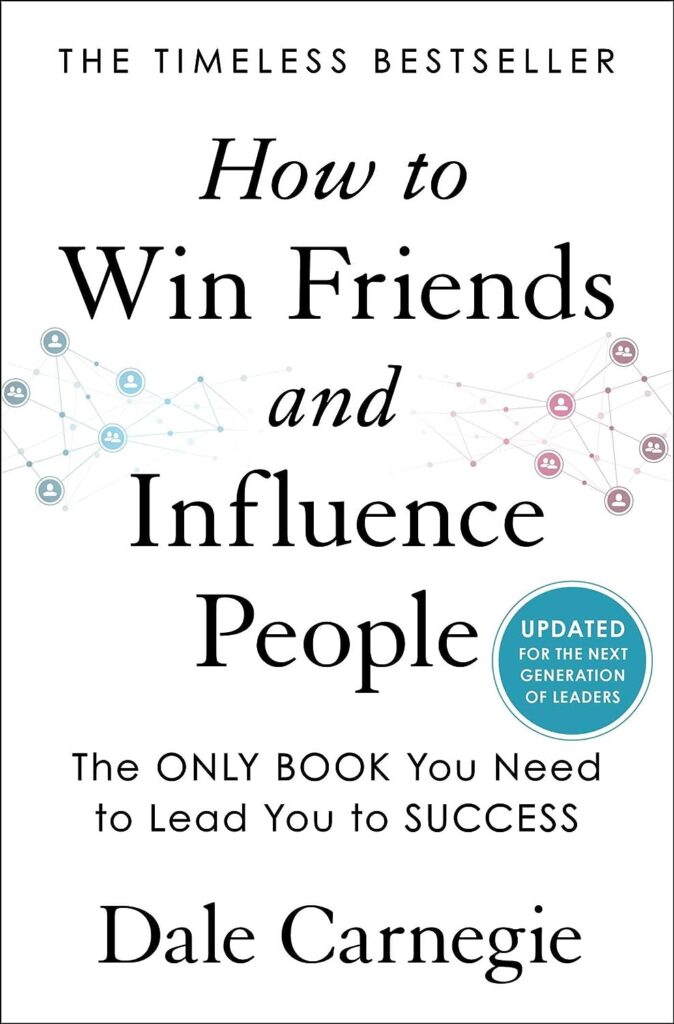In the realm of personal development and social skills, Dale Carnegie’s seminal book, How to Win Friends and Influence People, is often heralded as a cornerstone. It offers timeless advice on how to navigate social interactions, emphasizing positivity, empathy, and consideration.
However, despite its valuable insights, some readers find themselves grappling with an inherent tension: the balance between maintaining a positive demeanor and being authentically human. This blog post explores this nuanced challenge and offers practical strategies for achieving a harmonious balance.
Key Takeaways:
- Striking a balance between positivity and authenticity is essential for genuine relationships.
- Emotional vulnerability is a crucial aspect of deepening connections.
- Implementing social skills from How to Win Friends and Influence People can be beneficial, but should be complemented with authenticity.
The Positivity Dilemma
Dale Carnegie’s book advocates for a positive approach to social interactions: always be kind, considerate, and keep a smile on your face. While these principles are indeed effective for making a good first impression and establishing rapport, they can sometimes feel restrictive. The expectation to be perpetually cheerful can create a sense of inauthenticity, as it may not always reflect one’s true feelings.
The Challenge of Constant Positivity
One of the primary criticisms of the book is the notion that to be universally liked, one must always project positivity. This can lead to a “robotic” demeanor, where individuals feel compelled to suppress their true emotions and struggles.
As one reader pointed out, this constant positivity can be unrealistic and emotionally exhausting. The pressure to always be “Mr. Happy Robot” can prevent genuine connections and hinder one’s ability to express vulnerability.
The Importance of Authenticity
Authenticity is a fundamental component of meaningful relationships. Being genuine and transparent about one’s feelings, whether positive or negative, fosters trust and deeper connections.
While it is essential to be considerate and empathetic, it is equally important to allow oneself to be human—to have bad days, express doubts, and share frustrations.
Balancing Positivity and Authenticity
The key to navigating this dilemma lies in balance. Here are some strategies to help you maintain positivity while staying authentic:
Be Selectively Vulnerable: Choose appropriate moments and contexts to share your true feelings. It’s okay to admit you’re having a tough day or express concerns, but consider the setting and the relationship with the person you’re confiding in. For example, sharing personal struggles with a close friend or trusted colleague can strengthen your bond, while it might be less appropriate in a casual or professional setting.
Practice Empathy and Perspective-Taking: While it’s important to be honest about your feelings, also strive to see things from others’ perspectives. Understanding that everyone has their own challenges can help you navigate social interactions with empathy and consideration. This approach aligns with Carnegie’s advice to be considerate of others, but without sacrificing your authenticity.
Set Boundaries: It’s crucial to establish boundaries in your interactions. You don’t have to share everything with everyone. Determine what you’re comfortable sharing and with whom. This allows you to be authentic without feeling overexposed or vulnerable in situations where it might not be appropriate.
Cultivate Genuine Relationships: Focus on building relationships with people who accept and appreciate you for who you are. These are the individuals with whom you can be your true self, without the pressure to maintain a facade of constant positivity. Genuine relationships are built on mutual understanding and support, allowing for both positive and negative emotions.
Integrate Positivity with Realism: Strive to maintain a positive outlook, but don’t ignore or suppress your true feelings. Acknowledge your emotions and find constructive ways to express them. For instance, if you’re feeling overwhelmed at work, instead of simply smiling through it, consider discussing your concerns with a supportive colleague or supervisor.
The Role of Emotional Vulnerability
Emotional vulnerability is a crucial aspect of deepening connections. It’s about showing others that you care, providing support, and adding value to their lives.
While How to Win Friends and Influence People offers valuable advice on establishing relationships, moving beyond the initial stages requires a different level of commitment.
The Process of Connecting: Know, Like, Trust
The process of building connections can be summarized in three stages: know, like, and trust. Carnegie’s book can help you navigate the first two stages—getting to know people and making them like you.
However, to build deeper, more meaningful relationships, you need to foster trust. This involves being emotionally vulnerable, showing genuine care, and being supportive.
Practical Tips for Emotional Vulnerability
Share Personal Stories: Sharing personal experiences and stories can help others relate to you on a deeper level. It shows that you’re willing to be open and honest, which can foster trust and connection.
Express Empathy: Show empathy by actively listening and validating others’ feelings. This demonstrates that you care and are willing to support them, which can encourage them to reciprocate.
Be Present: Be fully present in your interactions. This means giving your full attention, avoiding distractions, and showing genuine interest in the other person. Being present helps build trust and deepens connections.
Offer Support: Be willing to offer support and help when needed. Whether it’s lending a listening ear, providing advice, or offering practical assistance, showing that you’re there for others can strengthen your relationships.
Implementing Social Skills from How to Win Friends and Influence People
While it’s important to balance positivity and authenticity, the social skills outlined in How to Win Friends and Influence People are still valuable. Here are some key takeaways from the book and how to implement them effectively:
Smile: A genuine smile can go a long way in making a positive impression. It conveys warmth and friendliness, making others feel comfortable and valued.
Remember Names: Remembering and using people’s names in conversation shows that you value them and are paying attention. It’s a simple yet powerful way to build rapport.
Listen Actively: Active listening involves fully focusing on the speaker, understanding their message, and responding thoughtfully. It shows that you respect and value their perspective.
Show Appreciation: Expressing genuine appreciation and gratitude can strengthen relationships. Acknowledge others’ efforts and contributions, and let them know that you value their presence in your life.
Find Common Ground: Identifying shared interests and experiences can help you connect with others on a deeper level. It creates a sense of camaraderie and mutual understanding.
FAQs about Balancing Positivity and Authenticity
Q: How can I be authentic without coming across as negative?
A: It’s important to strike a balance. Share your true feelings, but also focus on constructive solutions and positive aspects. This approach allows you to be authentic while maintaining a positive outlook.
Q: What if people react negatively to my vulnerability?
A: Not everyone will respond positively to vulnerability, and that’s okay. Focus on building relationships with those who accept and appreciate your authenticity. These are the connections that will be most meaningful.
Q: How can I maintain positivity in a professional setting without feeling fake?
A: In a professional setting, it’s important to be polite and considerate, but you don’t have to suppress your true feelings. Find appropriate ways to express your concerns and seek support from trusted colleagues or supervisors.
Q: Can I still use the principles from How to Win Friends and Influence People while being authentic?
A: Absolutely. The principles from the book are valuable for establishing rapport and making a positive impression. However, it’s important to complement them with authenticity and emotional vulnerability to build deeper, more meaningful relationships.
Q: How do I know when it’s appropriate to share my true feelings?
A: Consider the context and your relationship with the person. It’s generally more appropriate to share your true feelings with close friends, family, or trusted colleagues. In more casual or professional settings, focus on maintaining a positive and considerate demeanor.
Related Articles
- Workplace Criticism: Strategies to Stay Confident and Thrive
- Proven Strategies for Instant Rapport
- Conflict Resolution: Unlocking the Secrets to Healthy Interpersonal Relationships
- The Secrets to Mastering Effective Communication: Tips for Lasting Impact
- How to strike up a conversation with anyone
Balancing positivity and authenticity is a nuanced challenge, but it’s essential for building genuine relationships. By integrating the principles from How to Win Friends and Influence People with emotional vulnerability and authenticity, you can navigate social interactions more effectively and create deeper, more meaningful connections.


